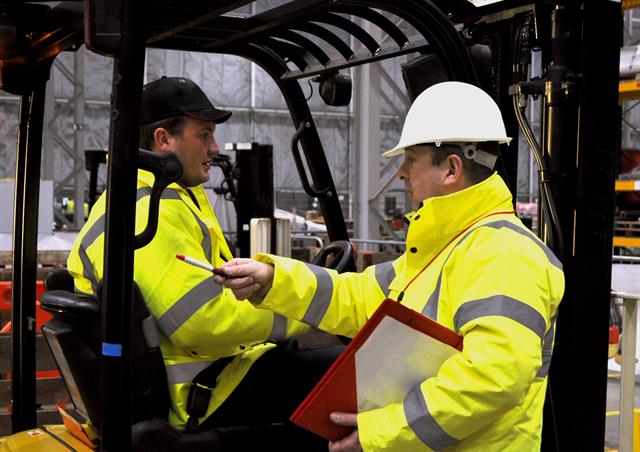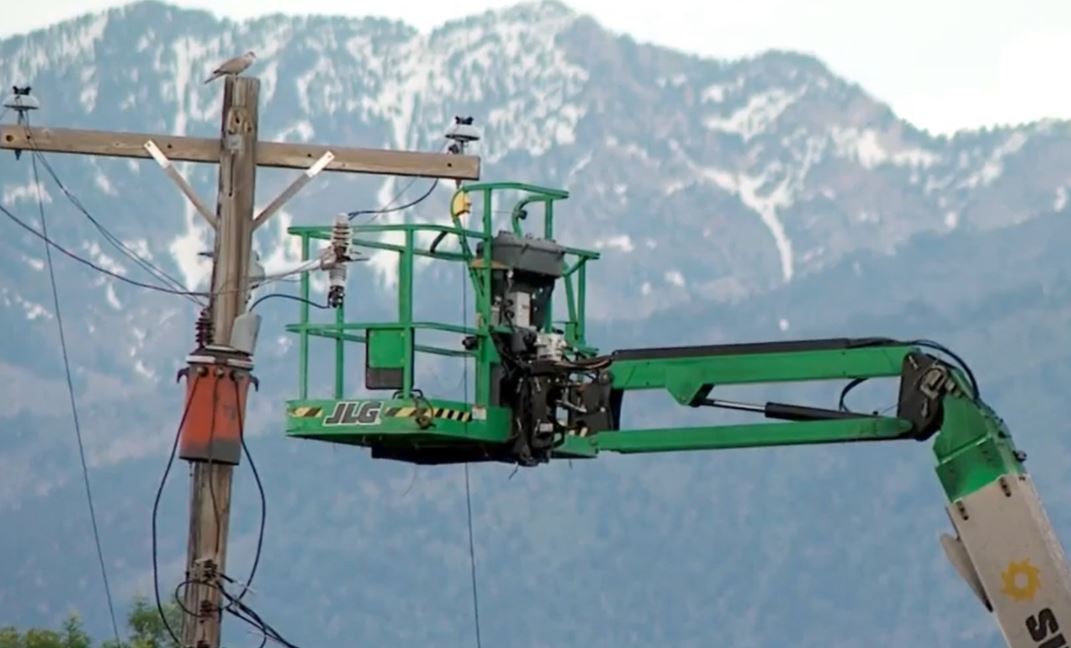But first, check out all the places we are delivering training this month...
 Imagine your operation as a tall building, where each safety measure is an individual building block.
Imagine your operation as a tall building, where each safety measure is an individual building block.
Operator training is one of the first foundation blocks, that helps to keep your structure steady.
It’s crucial but, alone, it is not enough.
Training operators to the highest standards will only reduce risk by so much.
So, this requires more blocks: supervision, safe systems of work, etc.
Together these elements all form a well-rounded, robust structure.
Remove one, however, and the structure weakens.
The more blocks that are missing, the more that safety is compromised and the greater the risk of collapse.
After all, accidents are rarely a result of one issue – they are usually caused by a combination of multiple failings.
It’s vital that you ensure all measures are in place to reduce risk as far as possible.
Here, we explore some of these key components and explain how they contribute to a safe, compliant and productive working environment.
1. Operator training
In the UK, the Approved Code of Practice L117 states that operators must receive three levels of training. Basic/novice training will equip operators with the core skills to operate a forklift safely and efficiently, but they must also receive job-specific and familiarisation training to understand the tasks, loads, site layouts and procedures associated with their job.
Around the world, specific training requirements may differ, but it remains essential that operators are qualified and ready to operate the equipment they intend to use before they begin work.
2. Safe Systems of Work
Different aspects of an operation require a defined set of rules.
In the UK, they are commonly known as Safe Systems of Work (SSOW).
They can apply to practices such as safe working distances around forklifts, pedestrian segregation, seatbelt rules and loading/unloading.
Without these systems, employees may be tempted to operate at their own discretion, leading to bad habits and risk-taking.
3. Awareness training for those on foot
On many sites, pedestrians will be working around forklifts, and providing these people with safety awareness training will help them understand the associated dangers and the role they can play in minimising risk.
Engage pedestrians as well as operators through methods such as toolbox talks, interactive courses and clear signage around site to remind them to keep a safe distance.
4. Manager and supervisor training
Operators have a responsibility to work correctly, but managers and supervisors need the knowledge and understanding to spot bad practice and potential hazards so that they can maintain a safe working environment.
5. Monitoring and supervision
Once managers and supervisors are trained and have the underlying forklift safety knowledge, they must be proactive in ensuring best practice is followed day-to-day.
By walking the floor and monitoring operator behaviour, managers will be able to spot skills gaps and can arrange additional training where necessary.
The sum of its parts
Without even one or two of these crucial building blocks, the safety of your operation is weakened significantly. Make sure they’re all in place on your site and, once they are, continually maintain them to ensure that your organisation’s approach to safety remains effective and robust for the long term.
Source: Forklift Action June 2023
Incident Report: Dealership fined almost $8k USD over forklift accident.
 A Nova Scotia-based industrial equipment dealership has been fined $10,000 for an accident that saw a forklift mast fall on a service technician working in Conception Bay South, pinning him underneath.
A Nova Scotia-based industrial equipment dealership has been fined $10,000 for an accident that saw a forklift mast fall on a service technician working in Conception Bay South, pinning him underneath.
The man, who suffered a partial hand amputation and a crushed chest, had not wanted to see anyone charged in relation to the incident and was grateful to the workers who had saved his life, prosecutor Amber Haighway said in provincial court in St. John’s Monday.
The Hurricane Industrial Equipment Ltd. employee was performing maintenance repairs to a 15,000-pound forklift at a Bluewater Agencies Ltd. property in Chamberlains in July 2020, when the forklift mast fell on him.
Bluewater employees heard the crash and attempted to use a small forklift to free the employee – who was choking due to the weight on his chest — to no avail. They eventually used a bigger piece of equipment to hoist the mast enough to slide the technician out from under it and gave him first aid until emergency services arrived.
A bottle jack used by the employee failed testing conducted as part of a subsequent independent examination, which revealed the jack had not been fitted with a device to prevent collapse in the event of loss of hydraulic pressure.
“On the date of the incident, the jack was not sufficient to support the equipment that (the employee) was working on. Secondary blocking was not used to support the equipment,” said defence lawyer Greg Anthony.
Hurricane Industrial’s policy requires employees to inspect a jack for physical deficiencies prior to using it and remove it from service if any are found. There was no evidence whether the technician had performed an inspection on the day in question.
Hurricane Industrial pleaded guilty to two violations of the province’s Occupational Health and Safety Act, one for failing to provide and maintain a safe workplace and necessary equipment, and another for unlawfully using a hydraulic jack for blocking an elevated part of mobile equipment, and the Crown withdrew six other charges. Bluewater Agencies had also originally been charged, but the Crown withdrew those charges last January.
Haighway and Anthony submitted a joint recommendation to Judge Jennifer Mercer for a $10,000 fine for Hurricane Industrial, which had never been charged under the OHS Act previously.
“It was not (the employee’s) desire through this process that any party be charged with regard to this incident. In a previous discussion that we had a few months ago, he also made a point of saying he was grateful for those persons who were around him at the time of the incident and indicated that without their quick response, he might not have lived,” Haighway told the court.
However, she pointed out, standards for laying and prosecuting OHS charges require companies to be held accountable for violations.
“It's every worker's right to attend their place of employment and to be free from risk, injury or death,” she said. “Without maintaining safe working standards and holding employers accountable for violations, each workplace has the potential to enable tragic results.”
Anthony told the court the incident wasn’t the result of a flagrant disregard for safety or any intentional conduct by Hurricane Industrial. He detailed the changes the company has made since the accident, including the implementation of a new jacking and blocking procedure; the monthly inspection by the company and yearly inspection by an external consultant of all jacks; weekly safety meetings with technicians, and the development of a mobile training app that provides lessons on safe workplace practices and other topics.
“The company does not compromise employee or project safety,” Anthony said, adding the employee had undergone jacking and blocking training a year prior to the accident and is a respected and valued field service technician who had “always been viewed as having good judgment and as being a very safety oriented individual.”
Hurricane supported the man during his recovery by keeping him on the payroll, paying for his physiotherapy and extra medical expenses, and accommodating his slow return to his regular duties last year, Anthony said.
“Hurricane … accepts and acknowledges its responsibility in this matter and there's a heartfelt desire for healing for all of those involved,” he told the court.
Mercer accepted the joint recommendation and gave the company 90 days to pay the fine.
Source: Saltwire June 2023
Ask Bob
Hi Bob,
 Question:
Question:
We have switched to Electric Powered forklifts in one of our facilities.
Is there a specific forklift inspection form for electric ones or can we use the same inspection sheets as a propane powered forklift?
Answer:
Thanks for checking in with us.
Our SFL forklift inspection checklist will work with with electric forklifts too, so you should be good to go.
We update the forms regularly so you may want to look on your Dashboard and make sure you have the most current one.
Bob
Interesting Articles

Testimonials
 "Thank you IVES for training me and giving me the confidence as a trainer"
"Thank you IVES for training me and giving me the confidence as a trainer"
Aleksandra, Premium Forklift Train the Trainer Program.
"I came out of the course with a wealth of knowledge I can use when I am doing my training."
Paul, MEWP Train the Trainer Program.
Did you enjoy this newsletter? Sign up for our newsletter to receive more like this!